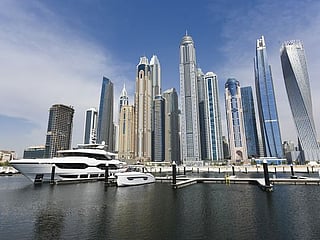The Pandemic triggered Dubai’s F&B industry to focus on local suppliers
Pandemic forces top-notch F&B outlets to shift their priorities from imports to local

Dubai: If you’ve ever dined out in Dubai over the last decade, you were most likely biting into imported, cheese, meats and even tomatoes. The Dubai F&B industry spent years relying rather heavily on international imports for ingredients. Restaurants proudly expressed how their “olive oil was all the way from Italy” or their “lobster was sourced from Canada.” It was at one point seen as somewhat of a brag to have imported ingredients.
Buying local not only saves costs for F&B businesses, but it also boosts the entire ecosystem and showcases the development of regional farming. But it all came together after the pandemic struck and forced restaurants to consider options other than importing.
“When we were in our pre-opening phase and researching the Dubai supplier market, I was surprised to find out how dependent the supply chain was on imports and how little choice of local product there was,” said Steven Nyugen, the Chef at Indochine. “So we sourced from Australia, France, and specialty seafood from Japan.”
But then the pandemic struck and Europe was hit quite hard, and Indochine’s supplies from France and Spain were halted. Much the same happened with supplies from the US and Australia, which affected their protein and meat supplies.
That’s when they took a chance on local suppliers. “There is incredible potential in the local market that is really untapped at the moment,” Nyugen said. “I think the major hurdles are marketing and distribution.
A lack of awareness
Indeed, specialty food producers and suppliers are out there, but it’s just that they will need to gain more visibility. Some restaurant operators are trying to mitigate that by striking special deals, including helping with the costs and logistics, with these farms and suppliers.
But it wasn’t the pandemic that triggered the Palazzo Versace to look at the local market. Mermarian has been championing this movement for a long time. “Honestly, we’ve been sourcing locally for many years and, unless exceptional cases of rare delicatessen, cheese or truffles are required, we buy only locally. There are some fantastic entrepreneurs in Dubai, with well put together farms and plantations,” Mermarian said to Gulf News. “The pandemic actually pushed us to be more creative and focus on the basic ingredients to create dishes. I found the best oysters and seafood at Dibba Bay - and we stopped importing from France for our brunches.”
Adjusting on the fly
Italian restaurants were among those to feel the pinch when supplies came up short. Chef Francesco Guarracino of Roberto’s in DIFC then had to make some quick adjustments to the menu.
“The most difficult time to source our products was between March and June - with very limited flights, nearly 70 per cent of our products proved very difficult to source,” he said. “We did remove some items and review the menu using the best products available to us at the time.”
Scalini, another high-end Italian eatery at the Four Seasons, also relied heavily on imported fresh produce and ingredients from Europe. They are now working with UAE based suppliers for their cheeses. Take the ricotta for example.
Chef Giuseppe Giampietro realised that the cheese made locally is of the same quality as the ones imported from Italy. “We found that soft cheeses developed by local suppliers have a difference in quality,” he added. “When importing cheeses, the freezing temperatures in the cargo changes the cultures of the product, which has an impact on taste.

“However, we started sourcing our Burrata and Ricotta locally every morning, and there is a noticeable difference in flavour. We also saved on cost, which was a lovely bonus.”
A downside of sourcing locally
When COVID first hit, local farmers began ramping up their harvest. Locally-grown farm produce is now more in demand as economies began looking for means of self-sustainability.
Although there are some incredibly forward-thinking producers like Emirates Bio Farms, Smart Acres and Badia Farms, seasonality is a big issue as winter is really the only growing season. So the question is, can biotechnology ensure crops all year round?
Here’s hoping that demand for local produce will become something permanent, rather than just a reaction to a global pandemic...
Sign up for the Daily Briefing
Get the latest news and updates straight to your inbox







